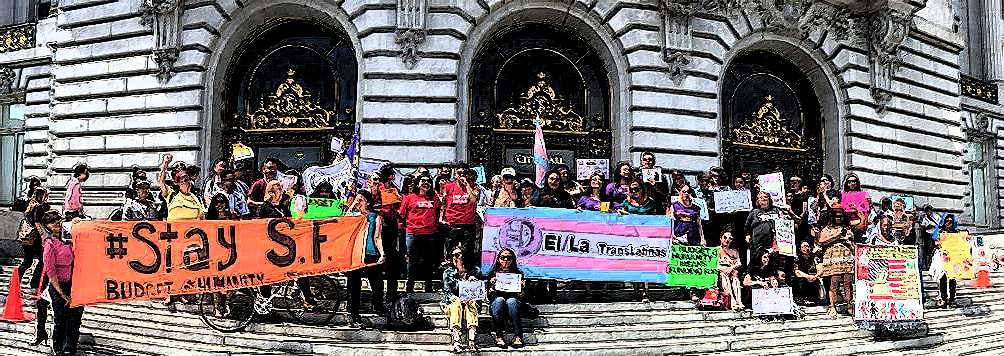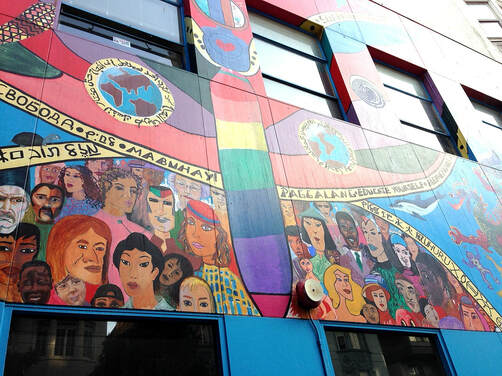Hospitality House Community Action
Budget & Finance Hearing at San Francisco City Hall
March 2, 2016
Hospitality House staff and board member spoke on the importance of allocating resources citywide to spread the success of the Navigation Center.
Hospitality House staff and board member spoke on the importance of allocating resources citywide to spread the success of the Navigation Center.
A FIGHT TO DO THE RIGHT THING: One of many to come
June 2016
Hospitality House is a proud and active leader in Market Street for the Masses Coalition (MSMC), a collective voice of community organizations and neighborhood residents in the Mid-Market, Tenderloin, and South of Market neighborhoods which formed in 2012. MSMC works to build partnerships across levels and groups, to inform and educate our members and constituencies, and to call for policies and programs that ensure development without displacement.
Hospitality House is a proud and active leader in Market Street for the Masses Coalition (MSMC), a collective voice of community organizations and neighborhood residents in the Mid-Market, Tenderloin, and South of Market neighborhoods which formed in 2012. MSMC works to build partnerships across levels and groups, to inform and educate our members and constituencies, and to call for policies and programs that ensure development without displacement.
|
Over the past year, MSMC has been engaged in discussions with market rate developers in line with its Minimum Expectations for New Market Rate Developments in the Mid-Market Area, a document describing six areas in which developers may be responsive to community needs when building in the Mid-Market and surrounding neighborhoods. One of these areas is the higher level of inclusionary housing expected by our communities in developments built inside areas as extremely low-income and diverse as the Tenderloin.When the 1066 Market project, developed by Shorenstein Residential, first came before the Planning Commission in March, MSMC opposed it on the grounds that it included only the minimum level of inclusionary housing required by law (12%). This was unacceptable to the coalition, as it did not come close to addressing the needs of residents of the Tenderloin. Not only was the percentage of units too low, the level of affordability was as well. The 36 units of on-site below market rate housing would have been affordable only to households with incomes much higher than those of many Tenderloin residents. Upon approval of the project by the Planning Commission, the Tenderloin Neighborhood Development Corporation filed an appeal on behalf of the community.
|
|
After continued community process, MSMC reached an agreement with Shorenstein Residential. The new deal called for Shorenstein to purchase the parcel of land at 101 Hyde Street, dedicate the land to the City, and contribute $6.5M to the development of 85 units of more deeply affordable housing at the site, a project that is much more responsive to the needs of the Tenderloin and its residents.“This victory is the result of residents and community organizations boldly standing up for the Tenderloin,” said Jackie Jenks, Hospitality House’s Executive Director and MSMC Co-Chair. “We applaud the Shorenstein group for coming to the table and working with us on a solution. But we would have never made it to this point had there not been a mandate from neighborhood residents to do right by them and insist on more than the bare minimum during this unprecedented affordability crisis.”
|
Community Members Call for a Budget for Humanity, Not Brutality, Dignified Housing, Food Security, Childcare and Fair Wages for San Franciscans
June 2016Last month, community members and leaders called on the Board of Supervisors to prioritize housing, childcare, immigrant and workers rights, and fair wages over a massive increase to police department and related criminalization expenditures.
The Budget Justice Coalition, a collaboration of over 30 labor and community based organizations serving impoverished people working towards a City budget that prioritizes poor communities, authored a $54 million proposal that would achieve greater justice for San Francisco. The proposal called for the removal of additional police academy classes, halting the criminalization of homelessness people, removal of funding from the reserve, and making reductions to office supplies citywide as a way to pay for this.
“In order to Stay SF, ” said Danielle West of the Transgender, Gender Variant, Intersex Justice Project (TGI Justice), “we have to halt the brutal level of criminalization poor people face in this city and instead respond to very real issue of poverty with investments in housing, food security, fair wages and childcare.”
The budget in San Francisco has received increased revenue through real estate transfer taxes, sales tax, and business taxes, and is now just over $9.6 billion.
“In the midst of so much opulence in San Francisco, a city with overflowing coffers, we must prioritize the people who are suffering the most – children and youth, people with disabilities, seniors, the underpaid, the unemployed, and the underemployed” said Jodi Schwartz of Lyric, who co-chairs the Budget Justice Coalition.
As a member of the Budget Justice Coalition, the Homeless Emergency Service Providers Association (HESPA), which is co-led by Hospitality House, believes that the City’s budget should increase resources to house homeless residents and prevent further displacement of low income San Franciscans.
To that end, the 26 member organizations of HESPA called for an investment of $38 million over the next two years into San Francisco’s housing and homeless systems. After much advocacy and collaboration with the Mayor and the Board of Supervisors, HESPA was able to secure $23 million of this request, which will fund much-needed rental subsidies, eviction defense, homeless employment services, and shelter services enhancements over the next two years.
“If we really want to make progress on ending homelessness,” said Jackie Jenks, Hospitality House’s Executive Director and HESPA Co-Chair, “we must make targeted investments in real solutions. Housing, employment, healthcare, and dignified emergency services are all essential to this goal. We appreciate that this budget – perhaps the City’s most important policy document – reflects these priorities.”
The Budget Justice Coalition, a collaboration of over 30 labor and community based organizations serving impoverished people working towards a City budget that prioritizes poor communities, authored a $54 million proposal that would achieve greater justice for San Francisco. The proposal called for the removal of additional police academy classes, halting the criminalization of homelessness people, removal of funding from the reserve, and making reductions to office supplies citywide as a way to pay for this.
“In order to Stay SF, ” said Danielle West of the Transgender, Gender Variant, Intersex Justice Project (TGI Justice), “we have to halt the brutal level of criminalization poor people face in this city and instead respond to very real issue of poverty with investments in housing, food security, fair wages and childcare.”
The budget in San Francisco has received increased revenue through real estate transfer taxes, sales tax, and business taxes, and is now just over $9.6 billion.
“In the midst of so much opulence in San Francisco, a city with overflowing coffers, we must prioritize the people who are suffering the most – children and youth, people with disabilities, seniors, the underpaid, the unemployed, and the underemployed” said Jodi Schwartz of Lyric, who co-chairs the Budget Justice Coalition.
As a member of the Budget Justice Coalition, the Homeless Emergency Service Providers Association (HESPA), which is co-led by Hospitality House, believes that the City’s budget should increase resources to house homeless residents and prevent further displacement of low income San Franciscans.
To that end, the 26 member organizations of HESPA called for an investment of $38 million over the next two years into San Francisco’s housing and homeless systems. After much advocacy and collaboration with the Mayor and the Board of Supervisors, HESPA was able to secure $23 million of this request, which will fund much-needed rental subsidies, eviction defense, homeless employment services, and shelter services enhancements over the next two years.
“If we really want to make progress on ending homelessness,” said Jackie Jenks, Hospitality House’s Executive Director and HESPA Co-Chair, “we must make targeted investments in real solutions. Housing, employment, healthcare, and dignified emergency services are all essential to this goal. We appreciate that this budget – perhaps the City’s most important policy document – reflects these priorities.”





